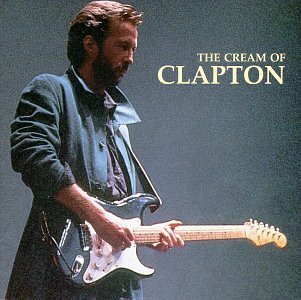
A fun NYT article about a link between celebrity and idolatry: In trying to discover why somebody would pay $959,500 for Eric Clapton’s signature Fender Strat named Blackie, or thousands still for a “replica” of Blackie, a team of researchers at Yale have theorized that the same urges that drove our ancestors to magic and voodoo make us think that the celebrity artifacts are somehow “contagious” (though you might instead be thinking of “The Pearl of Great Price” if you love rock-n-roll!). The article is short and worth a quick read- especially for anybody who a) loves Clapton, b) loves a celebrity, or c) needs a primer on the subtle mechanics of idolatry.
The researchers asked people how much they would like to buy objects that had been owned by different celebrities, including popular ones like George Clooney and pariahs like Saddam Hussein. People’s affection for the celebrity did not predict how much value they assigned to the memorabilia — apparently they were not buying it primarily for the pleasant associations. Nor were they chiefly motivated by the prospect of a profit, as the researchers discovered when they tested people’s eagerness to acquire a celebrity possession that could not be resold… The most important factor seemed to be the degree of “celebrity contagion.” The Yale team found that a sweater owned by a popular celebrity became more valuable to people if they learned it had actually been worn by their idol. But if the sweater had subsequently been cleaned and sterilized, it seemed less valuable to the fans, apparently because the celebrity’s essence had somehow been removed.
“That is a belief in what is also called imitative magic: things that resemble each other have similar powers. Cultural practices such as burning voodoo dolls to harm one’s enemies are consistent with a belief in the law of similarity,” Dr. Newman said. “An identical Clapton guitar replica with all of the dents and scratches may serve as such a close proxy to Clapton’s original guitar that it is in some way confused for the real thing. Of course, the replica is worth far less than the actual guitar that he played, but it still appears to be getting a significant amount of value for its similarity…”
 “Consumers use contagious and imitative magic to imbue replica instruments with power,” Dr. Fernandez and Dr. Lastovicka write in a forthcoming issue of the Journal of Consumer Research. “Semiotically signified magical thinking causes replicas to radiate aura and thus transforms them into fetishes.”
“Consumers use contagious and imitative magic to imbue replica instruments with power,” Dr. Fernandez and Dr. Lastovicka write in a forthcoming issue of the Journal of Consumer Research. “Semiotically signified magical thinking causes replicas to radiate aura and thus transforms them into fetishes.”[Guitarist Robert Ender] said he was planning to bid, although he suspected that the 1957 amp, like the replica of Blackie, would be beyond his price range. “It would be so cool to have any of these amps or guitars,” he said. Asked to explain the allure, Mr. Ender fell back on another word for magic. “Any connection with Eric,” he said, “adds some kind of musical mojo.”

COMMENTS
One response to “Voodoo Child: Classic Rock, Celebrity, and Idolatry”
Leave a Reply













If memory serves a friend of mine once told me that he noticed that single men in the megachurch he attended for a while tended to get girlfriends not long after they adopted the dress code of the pastors at the church particularly if they were already community group leaders. It was like some kind of social uniform that single women interpreted as indicating eligibility my friend joked. There may be a fine line between Psalm 16:3 and an idol. Pastors, for their part, can find themselves copying material from celebrity pastors. The idolatry of mimicking a successful pastors methods or plagiarizing material suggests, to me at least, that a similar kind of sympathetic magic can be afoot rationalized by pragmatism.